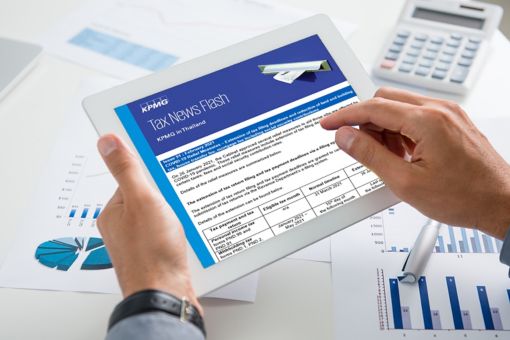New Transfer Pricing Disclosure Form Can Increase Customs Valuation Risk in Thailand
Tax & Legal News Flash Issue 64
In November 2019, the Thai Revenue Department (“TRD”) released the Notification of Director-General of the TRD on Official Transfer Pricing Form (“Disclosure Form”). The Disclosure Form requires information concerning the relationships between related parties and the value of related party transactions which must be disclosed to the TRD. The Disclosure Form is valid to taxpayers who have related party transactions with total annual operating revenues of THB 200 million or higher and have an accounting period starting from 1 January 2019 onward. More details on the Disclosure Form are discussed in our Tax & Legal News Flash No. 63

Intercompany payments made in accordance with a group’s transfer pricing (“TP”) policy or intercompany agreements which need to be specified in the Disclosure Form (e.g. royalties, license fees, technical service fees, management fees, commission fees) may also be reflected in the customs value of imported goods if they meet the conditions prescribed under the customs regulation.
Related party transactions have been one of the key focused areas for post-clearance audit conducted by the Thai Customs Department (“TCD”). The information obtained from the TRD such as withholding tax returns (Form P.N.D. 54) and self-assessed VAT returns (Form P.P. 36) is a primary source of information for the TCD to identify whether the importers have significant intercompany payments. The TCD has been using such information together with the importers’ information available in its database to decide if they need to scrutinize the importers whether their related party transactions have any impacts on customs value of imported goods.
In 2020, when taxpayers submit the Disclosure Form to the TRD, the TCD will be able to collect complete data on the taxpayers’ related party transactions. The Disclosure Form will become the most transparent source of information for the TCD to scrutinize importers regarding their related party transactions and may lead to further inspections on customs valuation issues. For instance:
- If the TCD discovers from the Disclosure Form that the cost of purchasing goods from related parties is significantly different from the total declared customs value on import declarations collected by the TCD, it may lead to the TCD’s scrutiny on related party transactions to determine whether the declared customs value is the transaction value of imported goods.
- If the TCD discovers from the Disclosure Form that there are royalties and/or other intercompany payments paid to overseas related parties, the TCD may suspect whether the royalties and/or intercompany payments paid should be included in the customs value of imported goods. If this is the case, the TCD may request supplementary documents such as intercompany agreements or TP documentation for comprehensive reviews.
As a result, we foresee that the TCD’s surveillance on related party transactions will be significantly enhanced. If an importer is unable to provide clarification on related party transactions or fails to include the value of related party transactions in the customs value of imported goods, the importer may be accused of duty evasion under Section 243 of the Customs Act B.E. 2560 (2017) with a maximum imprisonment of not exceeding 10 years and/or a customs penalty at 50%–400% of customs duty shortfall.
KPMG recommendations
With the TCD’s increasing alertness on related party transaction issues, the best course of action is to take preventive measures in order to manage and minimize potential customs risks in advance, particularly for those who fall under the following criteria:
- Have import transactions from related parties;
- Have significant amounts of intercompany payments and/or TP adjustment transactions;
- Have total annual operating revenues of THB 200 million or higher; and
- Have an accounting period starting from 1 January 2019 onwards.
To be thoroughly prepared, the importers concerned should consider taking the following actions prior to the submission of the Disclosure Form:
- Review the list of related party transactions and identify if any transaction can impact on customs valuation of imported goods.
- Review intercompany payment agreements, including customs risks in relation to payment conditions, services in the agreements and actual services received.
- Review TP policy, TP documents, Advance Pricing Agreement, TP transactions and practice related to import transactions.
How KPMG can help
We welcome any opportunity to discuss the relevance of the above matters to your business. Our dedicated specialists would be pleased to assist you with the following:
- Review intercompany payment agreements (e.g. royalty agreement, license or trademark agreement, technical service agreement, management agreement, commission agreement) to identify potential customs risks that may arise from the agreements.
- Advise on appropriate actions that could be taken should any customs risks be discovered.
- Assist with implementation of recommended actions to manage the customs risks on both historical and future import shipments.
Connect with us
- Find office locations kpmg.findOfficeLocations
- kpmg.emailUs
- Social media @ KPMG kpmg.socialMedia


